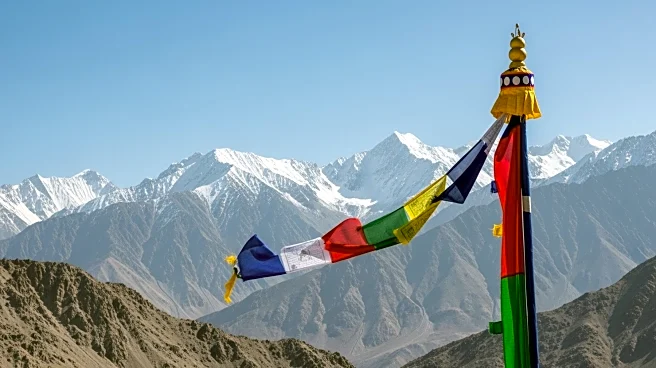What's Happening?
Ladakh, a region with a distinct cultural identity, has been grappling with issues of self-governance and marginalization since its incorporation into the erstwhile state of Jammu and Kashmir in 1834. Historically administered from Jammu and later Srinagar,
Ladakh has experienced a lack of genuine self-governance, which has deepened its sense of alienation. The region's quest for identity has been marked by protests and demands for Union Territory (UT) status, which was finally granted in 2019. However, the absence of a legislative assembly and direct governance by the central government has left little room for local participation in decision-making. Recent budget cuts to the Ladakh Autonomous Hill Development Councils (LAHDCs) have further fueled discontent, despite subsequent restorations following protests.
Why It's Important?
The situation in Ladakh highlights the broader challenges of governance and representation faced by small, culturally distinct communities within larger political entities. The region's struggle underscores the importance of local participation in governance to ensure that the unique needs and aspirations of such communities are addressed. The ongoing protests and demands for greater autonomy reflect a persistent sense of disenfranchisement, which, if unaddressed, could lead to further instability. The central government's approach to Ladakh could serve as a precedent for handling similar issues in other regions, impacting national policies on regional autonomy and governance.
What's Next?
The central government may need to engage more meaningfully with Ladakh's leaders and communities to address their concerns and aspirations. This could involve revisiting the governance structure to allow for greater local autonomy and participation. The ongoing demands for inclusion under the Sixth Schedule, which provides for greater autonomy to tribal areas, may gain traction as a potential solution. Additionally, addressing unemployment and economic development in the region will be crucial to alleviating some of the underlying causes of discontent.
Beyond the Headlines
The situation in Ladakh raises important questions about the balance between national unity and regional autonomy. It highlights the ethical and cultural dimensions of governance in a diverse country like India, where multiple identities coexist. The region's struggle for self-determination is not just about political power but also about preserving cultural heritage and ensuring that local voices are heard in the corridors of power. The outcome of Ladakh's quest for identity could influence similar movements in other parts of the country, potentially reshaping India's approach to regional governance.
















